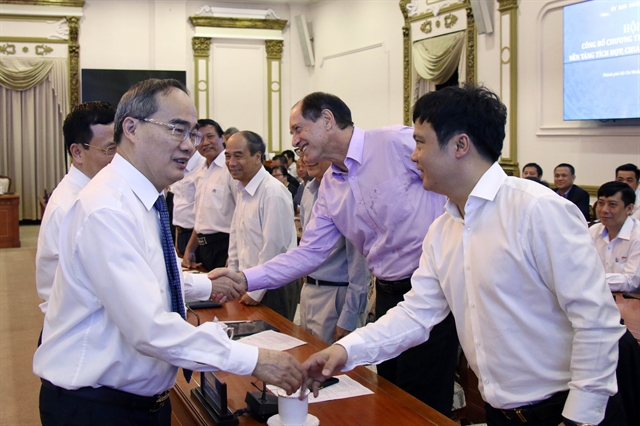 Society
Society

HCM City yesterday (July 22) introduced its digital transformation strategy to information and communication technology (ICT) enterprises and associations that will be involved in the implementation of the programme.

|
| HCM City Party Committee Secretary Nguyễn Thiện Nhân meets experts and representatives of enterprises at a conference introducing the city’s digital transformation strategy held yesterday (July 22). — VNA/VNS Photo Tiến Lực |
HCM CITY — HCM City introduced its digital transformation strategy to information and communication technology (ICT) enterprises and associations that will be involved in the implementation of the programme.
Based on the national digital transformation programme, HCM City's digital strategy aims to build a smart city and framework for e-government.
Speaking at a conference on the programme held earlier this week, Dương Anh Đức, vice chairman of the city People’s Committee, said: “HCM City will become a smart city with e-government, e-enterprises and an electronic society by 2030.”
By 2030, the city aims to offer all public services online, provided via multiple means, including mobile devices, according to Đức.
A database will also be set up that will assist in the development of e-government, e-economy, and electronic society by that year.
“The e-economy is expected to account for 40 per cent of the city’s gross regional domestic product and annual labour productivity would increase at least 9 per cent by 2030,” Đức said.
Under the plan, the rate of residents and enterprises having electronic accounts for payments would be more than 85 per cent by 2030, he said.
To obtain these goals, the city would strengthen communications and improve awareness of its staff, residents and enterprises, Đức said.
The city would also carry out many methods to ensure cybersecurity and create shared databases.
Digital transformation will affect all sectors of the city economy, including health, education, transport, finance-banking, tourism, agriculture, logistics, environment, and energy.
Lâm Nguyễn Hải Long, chairman of the HCM City Computer Association, said the association was working with other associations in the city to publish a catalogue of IT products for enterprises’ digital transformation efforts.
“The city should provide free IT infrastructure for small- and medium-sized enterprises, and IT enterprises should offer services for digital transformation at a low price,” Long said.
He said that the city should choose enterprises located in the city to provide technologies for the digital programme because similar projects were already being carried out by IT enterprises in other provinces and cities.
At least 30 per cent of the funds for technology and science development of corporations under the HCM City government should be used for digital transformation, he added.
“Each commune and ward should have specific IT applications to serve residents and enterprises in their locality,” he added.
Chu Tiến Dũng, chairman of the HCM City Union of Business Associations, noted the importance of good infrastructure and a legal framework for digital transformation.
Transactions in the digital environment should be convenient for enterprises to use, he said.
“Over the last six months, after the COVID-pandemic broke out, enterprises have recognised the importance of technologies in their operations and management. Digital transformation will be the element to help them improve competitive capacity and develop sustainably,” Dũng said.
He said the association would assist enterprises in undertaking digital transformation if they faced problems in implementation.
Ngô Vi Đồng, chairman of the Việt Nam Information Security Association in the southern region, said that policies related to the digital transformation programme should be continually updated to match technologies' frequent changes.
He said the association would work with the city to develop human resources to carry out the programme and that it would hold more drills to address cybersecurity issues for relevant agencies.
Nguyễn Văn Khoa, CEO of FPT, said that FPT had been working with the city on setting up e-government and a local government service platform, and providing several IT applications to city departments.
“The city is going in the right direction,” Khoa said.
He noted, however, that the capacity of many enterprises for carrying out certain tasks was weak, and that the city should create the most favourable conditions for them to access the city’s shared databases.
HCM City Party Committee Secretary Nguyễn Thiện Nhân said the city was the first to publish a report on its digital transformation programme.
“The city has chosen a way to develop more rapidly by exploiting the strength of IT and Artificial Intelligence (AI). The city believes in experts, enterprises and universities which have conducted research on AI to help carry out the digital transformation programme,” Nhân said.
Digital solutions would also increase staff productivity, which will improve public services, he added. — VNS